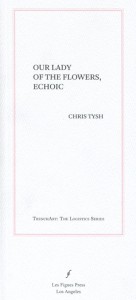What I Want From Santa Claus
Christmastime is the best time. There are sparkly lights and cute reindeer and cute snowmen and cute songs, and so on. There’s also a lot of gifts to be given, which is great, especially if you like books and things, as I do. Alas, almost all Western culture subjects won’t get any gifts from Santa at all, as they only care about their Twitter feed, their sexuality, and leading a “grievable life” so that this doesn’t happen to them. But for those thoughtful boys and girls who don’t go around kissing dead Nelson Mandela’s tushy, they should expect estimable presents. These are the ones I want:
Gossip by Samantha Cohen: Gossip can be malicious and harmful, so everyone should do it.
Cunt Norton by Dodie Bellamy: While the cannon is actually quite commendable, so is cutting, which is what Dodie does to one of the Norton anthologies.
Salamandrine: 8 Gothics by Joyelle McSweeney: According to Diane Sawyer, those divinely deathy Columbine boys “may have been a part of a dark, underground national phenomenon known as the Gothic movement and that some of those Goths may have killed before.” So…
Begging For It by Alex Dimitrov: This boy was the subject of some criticism for his appropriation of some kind of AIDS-related art. But AIDS is silly, and Alex is sort of cute.
Butcher’s Tree by Feng Chen: Her Spork book, “Blud,” was really cute and sassy, so these poems probably will be as well.
Our Lady of the Flowers, Echoic by Chris Tysh: Jean Genet was a violent, cutthroat boy, and I want to see Divine and Dainty Feet in verse.
Haute Surveillance by Johannes Goransson: Johannes read an excerpt from this at the first and only ever Boyesque Reading (also featuring Peter Davis, Tyler Gobble, and me). It was violent, stylish, and totalitarian.
The Memoirs of JonBenet by Kathy Acker by Michael du Plessis: JonBenet Ramsey was cute and tragic. This year, she published a collection of rhymes for my cute and thoughtful Tumblr, Bambi Muse. I want to see how Michael portrays the pageant princess.
The Mysteries of Laura by Andrea Quinlan: It’s a collection of poems that are Victorian and gothic, which is to say it’s Charlotte, Emily, and Anne Bronte and Dylan Klebold and Eric Harris.
Mother Ghost by Casey Hannan: I like ghosts.
Thank You for the Window Office by Maged Zaher: He once composed a very pleasing poem about Paris Hilton.
Since the outside is important too, you should be decking a delightful outfit while you wait for Santa to come. For girls, picking out what to wear isn’t arduous at all, as all girls should wear what they should wear all the time, a babydoll dress, a big but elegant hairbow, and ballet flats. For boys, choosing the correct clothes is much more vexing. Most boys hold the opinion that tight jeans and an ironic top are stylish. But this isn’t so. Style should have meaning. Boy in the vintage Supersonics Shawn Kemp jersey, can you inform everyone who Shawn Kemp is? Are you aware that he once showed up to the Cavaliers training camp as an unacceptable fatty? No, you’re not. Style, like literature, must have meaning. So, while anticipating Santa’s arrival, all boys should wear a meaningful outfit, like the one that I am:
Sunnies because eyes should be kept secret.
Basketball hoodie that I stole from a friend, because basketball players are like monsters.
Purple-striped dress shirt because it’s proper.
A skirt because boys should wear skirts.
Skull-and-crossbone pants because they’re deathy.
Werewolf purple socks to match the purple dress shirt.
Buckled shoes because they’re proper too.
Our Lady of the Flowers, Echoic by Chris Tysh
 Our Lady of the Flowers, Echoic
Our Lady of the Flowers, Echoic
by Chris Tysh
Les Figues Press, Oct 2013
144 pages / $15 Buy from Les Figues Press or SPD
As the second installment of her three part project titled Hotel des Archives, Chris Tysh took up the bold task of versifying Jean Genet’s hallucinatory first novel, Our Lady of the Flowers. The original novel, as Jean-Paul Sartre implies in his introduction, is already on the brink of being poetry itself: “Are we so far from poetry? Can it be that poetry is only the reverse side of masturbation?” Tysh, whether knowingly or not, explores this very question through the creation of this work.
The structure of the poetic translation restricts itself to two seven lined stanzas per page, a form with traces of the sonnet. And like Wordsworth said in “Nuns Fret Not at Their Convent’s Narrow Room,” those who “felt the weight of too much liberty/Should find brief solace there,” in the confines of the sonnet. It was, after all, in the ultimate form of confinement—prison—where Genet, left all to himself, found the inspiratory pressure to extricate the original work out of his mind and onto brown prison paper. However, the original, in all its poetic imagination did not have the compressed punch that regulated poetry is able to deliver, at least not throughout the entire work. Rather, the original novel reads as if trudging through the muck of Genet’s subconscious desires in order to find anything worth building metaphysical meaning out of. What Our Lady of the Flowers, Echoic succeeds in doing is adding further restraint onto the original text in order to pull out the skeletal story of the original novel, which is the story, metaphorically—through a constant changing and killing off of self—of becoming an artist.
The characters in Genet’s original version are nearly empty figures (with the exception of Divine) who allow the reader to input his or her own projected experience of others into them. As one of the earliest attempts of modern queer debauchery, its form is ephemeral, hazy, experienced in the realm of spirits more so than in convention. In Echoic we get more of a straightforward narrative of events, aiding a reader of the original through this poet’s perspective on the novel. The original is, after all, highly open to interpretation, and like the scene where Genet lies in his prison cell and imagines “the hundred Jean Genets glimpsed in a hundred passers-by,” this poetic translation acts, as suggested in the title, as an echo or reflection of the original work. So naturally, some aspects may be left out, altered, and perhaps even heightened.
One particular triumph of Echoic is the calming pace verse imposes on the novel. The same haunting imagery is present, but now in a format that allows for easier focus and digestion of potently translated scenarios. This sharpening of the original sometimes makes for more accessibility, but, of course, leaves out some of Genet’s personal quirks as narrator. Let’s compare the standard Bernard Frechtman translation to Chris Tysh’s new one.
This paragraph gets condensed and altered into about four lines in Tysh’s version:
Nor the Holy Virgin, not like their wrath,
Contempt for her brand of loving
Until Gabriel makes the scene. I see him
Walking down a street, almost running
Bumping into D as the doorbell rings twice
Above the little candy store he’s ducked into
October 21st, 2013 / 11:05 am

